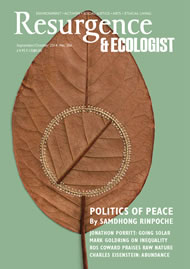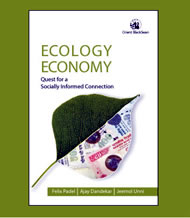In this book I aim to address some of the key environmental and economic conundrums of our time from an India-centric perspective. One starting point is the strangeness that the words ‘economy’ and ‘ecology’ emerge from the same roots, yet their meanings have diverged so radically that divisive issues such as fracking, the badger cull and how to reduce global warming are perceived in opposite ways by two ‘cultures’ who barely dialogue. In general, environmental activists seem much more articulate, but money tends to speak louder than words, backed up by abstruse arguments from economists, relayed through media, that no one outside our financial priesthood-elite seems qualified to question.
Another starting point is the meaning of ‘development’. Is the UK really a ‘developed’ country, and India a ‘developing’ country? Or could it be that this way of seeing is part of the problem? Don’t we need a radical rethink of ‘development’, bringing in spiritual and ethical dimensions? Should India really go on following the West’s model of rapidly imposed industrialisation? Or is there an urgent need for all of us – if we’re to survive as a species – to question received models and work towards attaining a stage, referred to as a ‘democratic civilisation’ by Kurdish leader Abdullah Öcalan, where power doesn’t have to corrupt and moneyed interests don’t have to determine elections; where conflicts can be resolved without recourse to war and we learn to share the Earth’s dwindling resources instead of squabbling over them while allowing the 1% to continue stealing the lion’s share?
Ecology, Economy challenges many ideas we take for granted. ‘Holy cows’ have long symbolised Indian ‘superstition’. Yet India’s radically decentralised, small-scale animal husbandry has not witnessed the terrible culls witnessed in Britain over foot-and-mouth and TB epidemics, let alone mad cow disease. Welcome to a different reality, where cows and bulls wander the streets safely and intelligently, not separated from humans and cars by barbed-wire fences.
But India is witnessing land grabs and conflicts over resources to match those in any country. In central India this has spilt over into “the worst war there has ever been in India” (though you’d barely know this from media coverage): on the surface an ideological conflict between Maoists and mainstream forces, yet actually a resource war over minerals and land, with mining companies transforming India’s acclaimed natural and cultural diversity into a wasteland and war zone of unspeakable atrocities. On the surface, Maoists oppose deals with mining companies. But the reality is more complex, and Mao’s attempt to rapidly increase China’s steel output in his Great Leap Forward gave a foretaste of India’s present path as the world’s fourth-highest steel producer.
All this is unfolding in the teeth of some of the world’s strongest grass-roots movements. Many of the mines and steel or aluminium factories are springing up on Adivasi land, and Adivasis (tribal people, India’s ‘original inhabitants’) are protesting in large numbers. Vast increases in police deployment are aimed not just at suppressing Maoists, but also at suppressing civil society opposition to contentious projects, especially steel and coal plants, dams and nuclear power stations.
Water is the most threatened resource. Green revolution ‘water mining’ has reduced groundwater levels drastically, drying out soil and contributing to the massive pressures that are driving small-scale farmers off the land. Producing 1 tonne of steel consumes and pollutes over 40 tonnes of water – over 1,000 tonnes in the case of aluminium. How are costs and benefits of such projects calculated? We take electricity for granted, but how much does a country like India really need?
‘Development projects’ implies an agenda of bringing people out of poverty, yet – as a mass of evidence from diverse sources shows starkly throughout this book – such projects are a root cause of millions of Indians’ increasing impoverishment. Whenever Adivasis are removed from their land in the name of ‘development’, their standard of living takes a nosedive.
So who has set this agenda? Above all – who else? – the banks, including the IMF and The World Bank, exercising heavy influence behind the scenes on government policies in most countries, reducing poverty only in words. This book’s penultimate chapter, ‘Development in a Financial System Based on Debt’, takes a hard look at ‘moneylender colonialism’ and the mechanism of using loans and debt to manipulate people and countries, ripping away and privatising common property resources. For anyone wishing to understand what’s going on in the India tourists don’t see, this book brings grass-roots inspiration for taking on the forces of capitalism.








